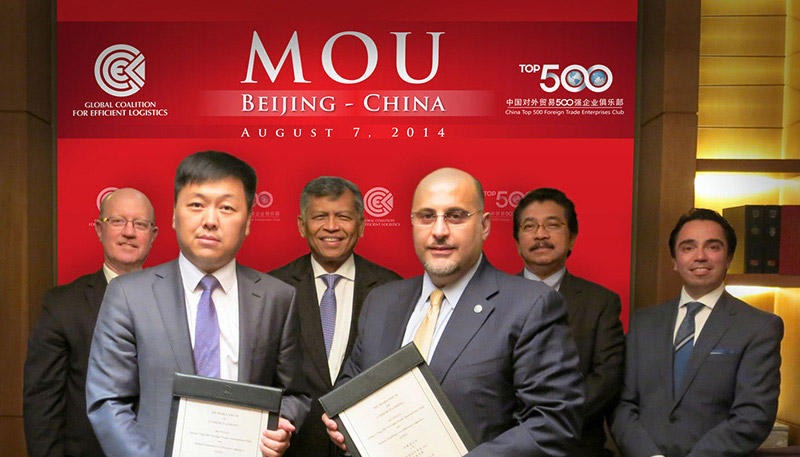China’s Top 500 Foreign Trade Enterprises Club and GCEL execute an MOU to collaborate on innovative technologies to increase trade efficiency.
China’s Top 500 Foreign Trade Enterprises Club (SSFERTC of the Ministry of Commerce) executed an MOU with the Global Coalition for Efficient Logistics – GCEL (Swiss based Non-profit Public-Private Partnership) to conduct a national Trade Efficiency Assessment of China’s trade practices. This is the first step to deploy the Digital Economy projected to reduce China’s trade costs by USD148.6 billion, increase its trade by more than USD400 billion and create millions of manufacturing and service industry jobs.
Mr. Zhao Yan, China’s Top 500 Executive Chairman stated: “Our business leaders are continuously supporting innovation. The Digital Economy tools are key to increase trade efficiency within China and between our trade partners globally. What distinguishes this invitation is the potential role that China can play not only as a user of the proposed tools, but also as a deployer. Thus, expanding China’s technology, financial and insurance service industry worldwide coinciding with our national strategy. The first step is to conduct Trade Efficiency Assessment to achieve two main objectives. One, to assess how much trade participants in China are presently maximizing on what technology can make possible. Two, to present how the Digital Economy can prepare China for the 21st Century Trade Efficiency Era. We must hear from the trade participants working on the ground.”
China’s Top 500 Foreign Trade Enterprises Club includes China’s largest corporations generating more than 40% of China’s foreign trade.
Dr. Surin Pitsuwan, GCEL Asia Advisory Board Chairman, 2008-2012 ASEAN Secretary-General and 1997-2001 Thailand Foreign Affairs Minister stated: “So far, we’ve executed MOUs with 72% of China’s trade partners to deploy the Digital Economy, 27.7% of which were assessed with their respective government and private sector experts. The results were staggering, 81% of trade participants have no system and 88% want the proposed Digital Economy Platform. To date, 1/3 of the G20 citizens demand the best of what today’s technology can make possible placed at their fingertips at no cost to the end-user. We have also commenced assessments in Turkey and Australia and we look forward to start the process in China.”
The MOU will trigger the national assessment in China and represents the foundation for a larger coalition to strive for greater trade efficiency. In this spirit, engagement efforts are ongoing with China Council for Promotion of International Trade (CCPIT), China Association of International Trade, ASEAN-China Center and China-ASEAN Business Advisory Council.
The Digital Economy provides the tools and the roadmap projected to reduce global annual trade costs by USD1.3 trillion, increase trade by USD1.2 trillion, provide a USD6 trillion services market opportunity and create a USD1 trillion SME fund generating 100 million jobs.
Captain Salloum, GCEL Co-Chairman, said: “For the last 15 years, we conducted R&D to create a Global Cell (G-CEL) working together to achieve Human Wealth (HumaWealth) by connecting the strengths of the world communities, creating wellbeing across humanity. Today, GCEL includes more than 150 countries, 26 NGOs/IGOs and the world’s prominent finance, insurance and technology firms servicing more than 60% of the world’s GDP. This Global Cell will deploy the HumaWealth global program that promotes trade efficiency through the Digital Economy Platform harnessing the power of 21st Century technology.”
Press Release featured in

